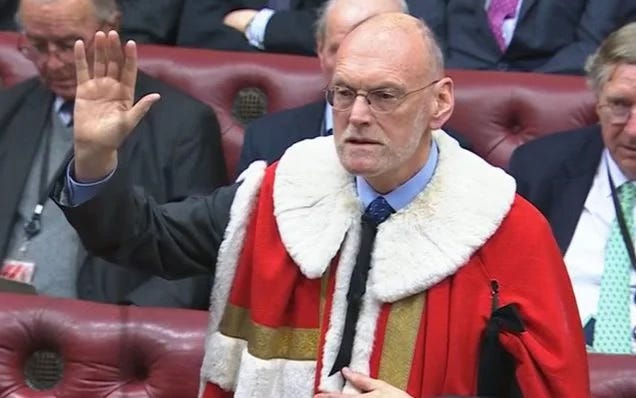Giving Cover to Genocide
No, the Israelis are still not committing genocide.
Part I:
A reader of a recent substack offering on the ethics of the war in Gaza has complained that I am “giving cover” to Israel’s genocidal policy. My immediate reaction was to say that I have no control over how other people use and abuse what I write. So, yes, supporters of Israel’s warfare could find succour in my view that, at far as I can see, its military policy in Gaza is not genocidal, provided that one adopts a properly strict definition of genocide. On the other hand, those same supporters could accuse me of “giving cover” to Hamas, since I have judged that the war that Israel is waging in Gaza is disproportionate and therefore wrong.
In a moment, I shall restate as clearly and succinctly as I can what my view is, before proceeding to criticise the recent statement by the International Association of Genocide Scholars. But before that, let me reflect on a related issue that my critic inadvertently raised in my mind: namely, whether my transition from the status of a professional academic to one of a legislator and public intellectual means that I ought to adjust what I say and how I say it.
I have long regarded it as my public vocation to analyse moral issues as thoroughly and even-handedly as possible, carefully considering the pros and the cons, but always with a view to working my way to a judgement. I have felt the need to do that, because, while academics can afford the luxury of wringing their hands and equivocating, those burdened with public responsibility usually can’t. Since they must take the risks of reaching a conclusion and making a decision, so must I. The danger of reaching a conclusion and making a judgement, of course, is that it might be the wrong one. I accept that. However, my attitude is that, since I will have made clear how I got there, if my judgement is shown to be wrong, then everybody will be the wiser for it. We all win—at the trivial expense of my bruised ego.
However, I am aware that I have a deep personal aversion to adding my voice to already-loud choruses. Is that just vanity, making me always want to stand out—to be outstanding? Maybe. But I prefer to think that it’s because, if the chorus is already loud, I doubt there’s any value in my adding to it. That’s why I haven’t yet published my largely critical views of Donald Trump. A friend of mine has suggested that it’s because it would be politically awkward for me to do so. I don’t think that’s the reason. It’s rather that I’ve not thought I had anything fresh to add to what’s already been said. And I have an aversion to being unfresh.
I also have a penchant for saying what others are not saying. Not, I think, because I am a frivolous contrarian, as some have dismissively suggested. I don’t choose to represent unfashionable positions just because they’re unfashionable. I choose them because I think that they’re true and important—and too much neglected. And since I am generally conservative and living in a largely ‘progressive’ social environment, an awful lot of what I consider important seems to me neglected.
But should my new-found status as a member of the House of Lords make a difference to what I say and how I say it? Should I take care not to say things that might ‘give cover’ to wicked people and immoral actions? Should I take care to say things about the likes of Donald Trump, just to reassure some people that I don’t support him (or other people that I do?). I don’t think so. I think that my public duty is not to squander my ammunition in saying what I’m expected to say and what all other ‘right-thinking’ people are already saying. It’s my duty to avoid the temptation to pontificate on matters about which I have no special expertise. It’s my duty to illuminate the moral dimension of public affairs as clearly as I can, so that even if folk don’t agree with my conclusions, they will be better equipped to consider the issues. And it’s my duty to draw attention to important aspects that are being overlooked.
Nonetheless, as a Conservative peer, I am aware that there are positions my party holds, with which I disagree—and yet I hold my tongue. Does that make me disingenuous? I don’t think so. When we commit ourselves to an institution—be it a political party or a church or a university or whatever—we owe it a certain loyalty, because we want it to flourish and we don’t want to cause it unnecessary trouble. Therefore, we tolerate a lot of things that don’t sit well with us, for the sake of the corporate good. Besides, protesting and fighting are exhausting, life is short, and we need to pick our battles. That said, I trust that, if my party were to adopt a position that I regarded as unconscionable, I would say so. And if it did not relent, I would resign.
But enough about me.
Part II
I won’t repeat here all the arguments I have already made on Israel and Gaza. If readers would like to consult them, they can be found in my posts of 8 May, 13 June and 21 August. However, in sum:
1. I do not regard Zionist settlement of Palestine as a case of ‘settler-colonialism’, where colonising Oppressors unjustly seized the lands of native Victims. Up until 1948 all the land occupied by Zionists had been purchased legally from Arab landlords.
2. I do think that the Balfour Declaration was a mistake—as did the only Jewish member of the British government, Edwin Montagu. I think that those who persuaded the British government to support Zionist immigration in the 1920s were naïve about Britain’s ability to manage the predictable conflict between Jewish immigrants and Arab peasantry and to forge a stable political arrangement out of it. Other members of the cabinet—not least Lord Curzon—thought it was naïve at the time.
3. As I understand it, however, it was the Arabs who consistently refused any two-state solution in the 1920s and ‘30s. Under the League of Nations mandate, the British were obliged to midwife an Arab state out of the ruins of the Ottoman Empire. In fact, they midwifed two: Jordan and Iraq. I do not believe that they had promised that Palestine would be part of such an Arab state and I do not think that Arabs had a just claim to a state of their own comprising all of the territory of Palestine. They did have a just claim, however, to belong to some state where they would be treated them justly.
4. The rise of antisemitism in Germany in the 1930s and the Holocaust in the 1940s made the case for an autonomous Jewish homeland unanswerable.
5. Notwithstanding its morally ambiguous beginnings—a feature it shares with many other states—the State of Israel deserves to exist now, since it is a sufficiently stable polity where executive power is accountable to its citizens and constrained by law.
6. During the Arab-Israeli War of 1948, some Zionists did use atrocious methods to expel Arabs, but many other Arabs fled of their own accord, leaving their land and homes vacant for Zionist settlement.
7. And it was Arab states who launched that war and Arab states that caused 900,000 Jews to flee to Israel.
8. I think that the ‘Iron Wall’ strategy, first articulated by Ze’ev Jabotinsky in the 1920s, has been shown to be a failure. Brutally candid about the irreconcilability of Zionist and Arab claims to the land of Palestine, his solution was for Israel to build an Iron Wall around itself, against which the Arabs would bang their heads, get tired, and then make peace. As I have written elsewhere, Arabs have been banging their heads for over a hundred years now and instead of giving up in despair and making peace, it has made some of them insanely violent—as was displayed on 7 October.
9. … that the West Bank settlements are a pure instance of ‘settler colonialism’ and, worse than being merely illegal, they are designed to make a two-state solution impossible.
10. … that Hamas’s massacre on 7 October was an instance of genocide, properly understood: deliberately intended to be indiscriminate and to exterminate a people.
11. … that Israel was justified in responding militarily, in order to destroy Hamas’s military power.
12. … that Hamas bears responsibility for deliberately provoking war among civilians in Gaza, and for building military tunnels for itself but not shelters for the civilian population.
13. … that Hamas bears responsibility for the prolongation of Gaza’s agony by retaining Israeli hostages.
14. … that, insofar as Israel’s military operations have moved beyond intending the immediate suppression of Hamas, to intending its permanent extinction, they have become disproportionate, because the goal or end of Hamas’s permanent extinction is not feasible. The risks and costs of Israel’s military operations, therefore, have become futile.
15 … that, insofar as Israel’s military operations are not integrated into any feasible political strategy for a peaceful settlement, they have become disproportionate, since all just warfare must intend a tolerably just peace.
16. All that said, I am not sufficiently expert about the politics of Israel and the West Bank to know what kind of peace-settlement is feasible. Certainly, insofar as the Palestinians support Hamas, which is constitutionally committed to the eradication of the State of Israel, I cannot imagine what a feasible road to peace would be.
Part III
Which brings us to the topic of genocide. For while I judge Israel’s military actions to be disproportionate, I do not regard them as genocidal. Why not?




